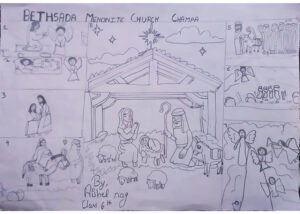Reading the Bible for ethics calls for a new approach to community. Above all else, it calls for the centrality of storytelling: storytelling at the centre of the community, between community members and between communities.
Reading Scripture is about being transformed by Scripture, and interpreting Scripture is about accumulating power. But living in peace means finding a way to not only be transformed by Scripture, but to share power. We do that through storytelling, telling our stories about what we experienced and what it meant to us.
This is not obvious. We are all looking for simple and straightforward solutions to problems that will minimize our time and energy, processes that will be fast and efficient ways of putting difficult issues behind us. But in our effort to solve problems in simple ways we ignore the complex and transformative power found in telling and listening to each other’s stories.
In our self-centred world we look for the lazy way out, not the one that will bring us into confrontation with ourselves, teach us about true community, or lay us bare before God and each other. Storytelling is not quick and easy, but as a people of Scripture—a body of laws, poems and teachings, and, above all else, stories—we should see that God’s way into our world is through stories. This is not accidental. We don’t know the stories of Scripture and tell the stories of Scripture because they get us to someplace else. The truth is in the stories.
Why this should be so becomes evident when we look at the way storytelling functions in communities. As storytellers, storytelling does many things to us, things inherent in the act of telling stories, things that transform our very humanity in some very direct ways. We cannot help it; telling and listening to stories tie us one to another. It is the way our brains work. If we tell our stories to each other, we produce community, and it does not matter what divides us. Storytelling changes our brains, individually and collectively, and we become a people.
As storytellers, there are three impacts:
• First, telling a story transforms the memory of the storyteller.
When we tell stories we take the time to organize our memories, dragging them through a set of filters that try to strip out the meaningless and socially define the meaningful. I tell my story by trying to think about my memories of my experience in terms you might want to hear.
But that helps me to hear them for the first time through what I believe to be an external point of view. I have my own feelings about my experience, but when I organize them to tell them to you I have to change, shape and reframe those feelings, and make sense of them in new ways that reflect communal values and understandings.
Quite literally, when I tell you my story, my memories of my experience change to match how I think you need to hear me. I apply a moral filter to my memories, and they become new memories now shaped by my sense of justice, mercy, peace and social harmony.
• Second, telling my story forces me to become vulnerable to your hearing of my story.
When I tell you my story, I place before you a narrative of human existence and you cannot help but judge it. That is what our association-engine brains do: they judge. Judging is what making associations is all about. And then your judgment shows in your body language, your stance, your gaze, the expression on your face.
It is a terrible opening of existence between people, the creation of a chasm of possibility that breaks our traditions, stereotypes, masks and personas. Everything about us becomes a possibility for unscripted hurt, love or anything else. Our public face is broken by the act of storytelling. In telling my story I am forced open to your judgment.
• But that brings us to the third part of storytelling for the narrators: the outcome remakes us as social beings.
Experiencing your response to my story, the evidence of your judgment tells me who I am in new ways. We never really know who we are until we obtain a response from others. We think we know. We have feelings about who we are. But until we look into the eyes of others and see their response to us, we never really know. If your gaze in response to my story is one of acceptance, then I know that deep inside I am acceptable. But if in your gaze I find condemnation or critique, then I know that there is something about me that needs to change.
Storytelling impacts listeners, too
Those three aspects of storytelling change the storyteller profoundly. To a lesser degree, but no less significantly, the act of storytelling changes the listeners. While listening is a voluntary response to a story, and thus something we can shut off, genuinely engaging a story as a listener, especially as part of a listening community, has five powerful impacts:
• First, we cannot help but test our own humanity against the humanity that emerges from the story.
Are we the same as, or different from, the character in the story? How would we have behaved in those situations? What about us is similar to, or different from, the humanity of the story? These questions emerge naturally as our brains seek associations to the story. They call our humanity into question and open us to the possibility that our humanity might be greater or lesser than we believe.
• Second, at the same time the story expands our understanding of what it means to be human.
We have the opportunity to reach through the story and into the experience itself, trying on with our imagination a world that is not our own. Every story takes us into the universe of human experience in ways that we could not achieve on our own. It is the gift of knowledge.
• Third, when we hear a story we take into ourselves something of the identity of the person who told the story.
Their narrative becomes part of our memory, and thus part of our being. Every encounter with storytellers now takes place in the context of what we experienced of their lives through the stories they told. They can never be “other” to us again because part of them is inside of us.
• Fourth, when we listen to a story in the context of a listening community, we test our response against all the other folk in the listening environment.
Their responses become part of our responses. We assess our response and modify it based on what the other people are doing. Are they bored? Then the story must be mundane. Did they gasp? Then there was something vital in that part of the story. And we take our cues to our humanity and that of the storyteller through the way we all respond together to the story.
• Fifth, we create a collective memory that leads to a new sense of identity.
When a community hears a story, how it responds becomes a collective marker regarding the identity of the group. It is a collective experience that leads to a response, and if the story is strong enough the response can reshape the community forever. It becomes a permanent marker that is not only remembered by those at the time, but which is transformed into a social memory that is passed through the generations.
A new kind of people, together
The result is that in storytelling we all, tellers and listeners, enter into a world of mutual risk and vulnerability. When we start to tell stories to each other we enter a special domain where we will become a new kind of people, one where we have reached into each other in understanding, judgment and permanent engagement.
We begin to construct a common humanity that is based not on boundaries and institutions, but on our emerging common humanity. The boundaries between us diminish and the ties strengthen. It does not mean it will be a happy or harmonious new community, but it will be one where we feel bound to work together across our boundaries.
This is why, when we baptize or welcome new members, we have them tell their stories. We are having them expose themselves to us in vulnerability, but at the same time we are broadening our own identities to become one with their new voices. With a story told, they are no longer strangers, they are part of us and we cannot easily remove them.
But making this work on a regular basis is no easy task. Once upon a time, we lived in villages, and villages lived by storytelling. Now we live in cities and, while more communication happens than ever before, and more knowledge flits about than our great-grandparents could imagine, we rarely tell our stories. We are cut off from one another, seeking to wrest out of knowledge the community we long for, and not even knowing that community is as simple and natural as telling each other our stories.
In the shadow of Scripture
So, like so many other things, we have to set up systems and design processes so we can return to the best of a very old practice.
We all have stories to tell. What we need are the appropriate venues in which to tell those stories. What we need are frameworks of critical sensitivity where we know we will be heard, and where we will be held accountable for what we say, and how we, in turn, listen.
The wrong stories may be told, and the right stories may be told wrongly. We need the right focus and the right framework, and it needs to be done in the shadow of the Scriptures we venerate and before the God we worship. It is a pastoral process. It is a priestly process. It is a prophetic process. Rightly done, we are slowly and bravely opened to each other and to our reality as a community of faith.
It starts in small groups. Establish groups of 12 or less, probably people who are a gentle mix of points of view and positions in life. They shouldn’t be so different that their stories are from different planets, but they shouldn’t be so much alike that they have only variations on one story. Then give them a topic around which to talk, and a guide to walk them through it, someone to hold the hands of the nervous and restrain the excessively enthusiastic.
All get a turn to tell their stories while all the others listen. It may take days, weeks or months. Gentleness must be the rule. At the end of it, we begin to know each other as fellow struggling believers, not merely masks of gracious goodness. We will have felt pain together, celebrated together and found wisdom together. The world will become brighter and we will have companions on the way.
We can do it as congregations if we are prepared to take the time to do it right. When a difficult topic becomes a congregational reality it is time for major processes of storytelling and listening, and these will take months or perhaps years. It means finding small venues, aggregating stories, being merciless about transparency in the process, and patiently waiting out the belligerent or fearful, who are often the same person.
We can do it as area and national churches. This becomes more difficult and requires the work of sociologists, church historians and the church press, as well as church staff people. It takes area and national events, and significant budgets. The process will take place over years or perhaps decades, until all voices can hear their story reflected in the area or national story. It is a process that technical apparatus like surveys can assist, if carefully and rightly done.
Any process can be misused, even storytelling. Every process must have gatekeepers, the folks who decide who gets to tell a story and who does not. Often these are folks who are frightened by possibilities. It is why they want to be gatekeepers. But that isn’t how a community works. In a community every voice must be present or it isn’t a community storytelling. Without every story, it is a strong-arming, an abuse of process by the more powerful against minority experiences, existences and humanities. We, the listeners, know when voices are silenced, and at that very moment we know that we are not a community in action, but a power struggle seeking a resolution.
But ultimately it is very simple. We all want to be recognized for our humanity, and telling our stories is the best way to do that. Plus, as God’s people under Scripture, we have a lot of good stories to tell. There are stories of bravery, tragedy, healing and hope. We have a lot of good stories, and in listening to them we hear the very Word of God reflected back to us, pulling us onward into a new humanity. We are doing the work of God’s people, and it is through our stories, in telling and in listening, that we come to know that truth.
Bruce Hiebert, M.Div., Ph.D., is a faculty member in business ethics at University Canada West, as well as a lecturer in Mennonite history at the University of the Fraser Valley, and adjunct faculty in ethics at the Vancouver School of Theology. He is a former Mennonite minister and long-time member at Langley Mennonite Fellowship, to whose members this document was addressed.
–Posted March 13, 2013
Also in the series:









Leave a Reply
You must be logged in to post a comment.